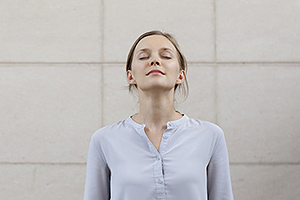Blind acupuncture in Japan is extremely common (approximately 20 percent of acupuncturists practicing in Japan are blind). The same is not true in the United States. Here in the states, only a handful of blind acupuncturists exist.
I want to share with fellow acupuncturists how to tap into their palpation and other non-visual skills to better themselves as practitioners. Japanese-style acupuncture relies on palpatory findings of the pulse, abdomen, back and meridians. While tongue diagnosis can be used, this is not something I find useful due to my lack of central vision.
 Another "trademark," if you will, of Japanese-style acupuncture is that the needles are finer and needling is more surface level. Additionally, Japanese-style acupuncture utilizes a guide-tube; typically, the use of the guide-tube makes needle insertion less painful for the patient and easier for the acupuncturist. The insertion tube that is now commonplace was developed by Waichi Sugiyama, a blind acupuncturist.
Another "trademark," if you will, of Japanese-style acupuncture is that the needles are finer and needling is more surface level. Additionally, Japanese-style acupuncture utilizes a guide-tube; typically, the use of the guide-tube makes needle insertion less painful for the patient and easier for the acupuncturist. The insertion tube that is now commonplace was developed by Waichi Sugiyama, a blind acupuncturist.
My Vision Loss and What It's Taught Me
I personally lost most of my vision at age 20 due to retinitis pigmentosa (RP). Up until that point in my life, I was a visual processor and went through life not understanding what energy sensitivity was or how people were able to utilize skills such as reiki or other energy healing techniques to create health in those around them.
Today, I understand firsthand what research says about losing a sense. Your other senses certainly take over. In my case, losing visual acuity resulted in my brain processing touch and sound better than I ever could before. My hands became my eyes and I was slowly able to detect subtle forms of energy within the body.
Owning Your Skills
Given my personal journey, I find it especially important to own the skills you have been granted and utilize whatever it is you do best. Whether those skills are visual, manual or auditory, you need to create your own way to interpret the body. After all, you need to practice and have confidence in your own skill set to restore health and happiness back into your patients' lives. Expand upon these skills that you have acquired naturally and that serve as the basis for your mastery.
Practicing New Skills
I would like to encourage other acupuncturists to expand upon their sense of touch and deepen their appreciation for the Japanese acupuncture art form. I find that without my sense of vision, I am able to listen more attentively to the body. Without visual stimuli, I can access deeper levels of disharmony and even feel where the patient is holding stagnation and thus promoting disease.
If you are looking for a quick exercise as to how to expand your sense of touch and palpation, find a friend or family member to practice with. With your eyes closed begin to palpate their body with light touch.
Your first goal is find KD 3; once you believe you have found it, open your eyes. Are you correct? Your second goal is to find live points; once you believe you have found a live point, open your eyes. Have your found an acupuncture point?
Your last goal is to find areas of pain, discomfort or disharmony. Once you believe you have found areas of pain, discomfort or disharmony, ask your "model" if these areas have experienced any discomfort or trauma.
As with any new skill, be patient, practice and take your time to foster its full potential. Allow yourself to practice with your own style – the style that works for you. Allow yourself to be different and innovative! The skills you may develop with a fresh perspective could pave your own way to master the medicine of acupuncture!
Allison Camire is the owner, herbalist and acupuncturist at North Shore Acupuncture and Natural Medicine in Beverly, Mass. She is a graduate of Massachusetts College of Pharmacy and Health Sciences (MCPHS) with a dual master's degree in acupuncture and Oriental medicine, with an additional concentration in Japanese-style acupuncture. Allison is a nationally and board-certified acupuncturist and herbalist through the NCCAOM, and is licensed by the Massachusetts board of medicine to practice acupuncture and Chinese herbal medicine. In addition, she is certified in Reiki healing and craniosacral therapy, and has undergone extensive training in energy healing and restoration.



